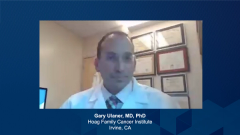
FES-PET in the Treatment of Patients With Breast Cancer: Clinical Case 3
Dr Jeremy Force illustrates how FES-PET aids in the treatment of patients with breast cancer through a clinical case.
Episodes in this series

Jeremy Force, DO: The next case that we have is case 3, with a 72-year-old female with early stage ER+ [estrogen receptor-positive], PR+ [progesterone receptor-positive], HER2- [human epidermal growth factor receptor 2-negative] invasive ductal carcinoma. She had surgery, it was a T1C lesion, grade 2. She had a high oncotype. She received adjuvant chemotherapy and 5 years of an aromatase inhibitor. She then came into my clinic complaining of new chest pain and dyspnea. She was found to have a new internal mammary lymph node based on a CT chest scan that was done in the emergency department. A biopsy was performed during her hospitalization, confirmatory of metastatic breast cancer, at least locally recurrent breast cancer to this internal mammary lymph node. Not metastatic disease, excuse me. But there wasn’t enough tissue for a biomarker assessment.
The FDG [fluorodeoxyglucose]-PET [positron emission tomography] scan you can see here. There was activity. But the FES-PET [F-18 fluoroestradiol-PET] was completely negative. From one study that came out of South Korea showing that when we see FES-negative disease, it’s 100% a negative predictive value that this will be estrogen receptor negative with biopsy. I think there is a lot of clinical utility with that in hand. We did encourage her to biopsy this again. As you can see, it’s right behind the sternum so it was slightly challenging to biopsy. But we were able to achieve that. It showed that it was triple-negative breast cancer. Thus, this was an isolated internal mammary lymph node recurrence.
We decided to move forward with curative intent. This was recently. She received dose-dense AC [doxorubicin, cyclophosphamide], carboplatin/Taxol with pembrolizumab. Basically, she didn’t participate in it, but we went off of the KEYNOTE-522 trial. She had a radiographic complete response and then subsequently received comprehensive radiation therapy and adjuvant pembrolizumab. She’s in follow-up and has no evidence of disease recurrence.
Transcript Edited for Clarity








































